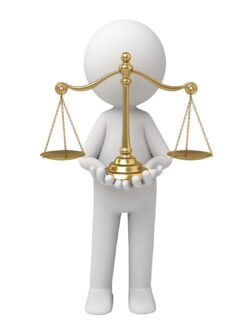Note:
If a red scroll bar appears on the right use it to see all headings.
How To Sue Someone in Small Claims Court or Superior Court

Reading time: 27 minutes.
This article assumes that the Superior Court aka the House of Horrors will be your forum because:
- You have been to Mediation which failed to produce settlement, or you or your adversary decided against Mediation.
- You do not have an Arbitration Agreement with your adversary
- Your case value is above the Small Claims Court limit, and you have not reduced your claim to fit within that limit.
Why are you going to the House of Horrors without first going to Mediation?
If you haven’t been to Mediation, remember to keep asking yourself, Why am I filing suit when the court is just going to refer me out to Mediation before it will hear my case? It’s a really good question. It’s got to be that you or your adversary is ????-headed.
🍪 Smart Cookie Tip: If it is you, get ready for a huge ride into a mansion of melodrama. If it is your adversary, they are not yet sufficiently threatened to make a wise choice which means you need to motivate them by filing your lawsuit followed by an Alternative Dispute Resolution proposal.
- Know what to expect
- Representing yourself: Know what it means
- Carefully plan your case
- Continually plan and re-evaluate your case
- Continually monitor your costs
- Propose settlement often
Step 1: Know What to Expect
 You are here because you were unable to detour your case into Small Claims Court or Alternative Dispute Resolution. You are in for serious business. You need to understand what lies ahead, even if you’re planning on hiring an attorney, correction: especially if you are hiring an attorney.
You are here because you were unable to detour your case into Small Claims Court or Alternative Dispute Resolution. You are in for serious business. You need to understand what lies ahead, even if you’re planning on hiring an attorney, correction: especially if you are hiring an attorney.
Land of the Litigation Frenzy
Now is the time for some strategic planning because you are entering into the Land of the Litigation Frenzy. It’s time to adopt a proactive strategy that conforms to your persona and your budget. You can only do this intelligently if you understand the playing field. In this case there is nothing playful about it. Entering the Superior Court system is serious business. That’s why it’s referred to as the House of Horrors.
Why? Because there is a ludicrous amount of very complex rules that must be adhered to and a huge variety of techniques to discover facts. It’s like being in the Big Ring but here you have more than your gloves to punch with. There are Complaints (the document you file with the court to begin the case) with an assortment of allegations to prepare and file, motions to be made to knock out your opponent, and a multitude of ways to be a detective. With each one, your opponent retaliates and very soon the Litigation Frenzy is in full swing!
Land of the Too Busy
Judges don’t have sufficient time to dedicate to the increasing volume of cases before them
The House of Horrors is also the Land of the Too Busy. The decision makers are civil servants with a staggering backlog of cases or jurors who had to show up to decide your case or be imprisoned. Although our judges are doing the best they can to dish out justice, they don’t have sufficient time or resources to dedicate to the increasing volume of cases before them.
The court system operates under the same deficits as any other public system that is accessible without limits
The court system operates under the same deficits as any other publicly funded system that is accessible without limits: it is seriously underfunded, understaffed, and overburdened. Case filings increase each year, especially since the Coronavirus, while staff downsizes.
The court system is open to anyone, without limitation Anyone can file a lawsuit
Think about it. The court system is open to everyone – without limitation. Anyone can file a lawsuit. Walk up to the court clerk’s counter (or do it online), pay a minimal filing fee, and away you go. You have yourself a lawsuit.
There are no citizenship or residency requirements. You don’t have to be an American citizen or a resident of the district in which you file suit. There are no financial requirements. Your income, or lack of it, doesn’t matter.
This open access to the courts brings mixed blessings. American democracy gives everyone access, but easy access has congested and overburdened the court system.
Once you are named a defendant (such an astonishing revelation), for a prolonged period you are stuck in a system that requires your participation and likely attorney representation to avoid a judgment being found against you. This is the sentence of the House of Horrors.
While preparing and filing your Complaint is challenging, the process just keeps getting more convoluted. After you pass through the portals, survival within the House of Horrors requires an endless supply of money and energy. It’s not the way of modern folks any longer. It should bear a warning sign, “Avoid this at all Costs”.
Lady Justice and her Scales

Far too many people expect the court system to produce a just result. They expect justice – their version of justice. Because of the symbols selected to represent justice, they are convinced that the legal system is finely tuned, balanced, and invincible, until they have their first court experience.
When it comes to civil justice, there is no absolute right or wrong
Their vision is of two scales equitably weighing justice in perfectly balanced proportions. They see Lady Justice as so pure and blind to bias and partiality. Law libraries are brimming with legal books jam packed with carefully articulated black and white rules and regulations. A scrupulous system records volumes of decisions applying these rules and regulations. How could anything go awry with all these standards in place?
Justice Is not Exact
But the truth is, when it comes to justice in the civil court system, there is no absolute right or wrong. There are no rigid rules for people to judge one another’s conduct – and that’s what the justice system does. It decides whether people have done what they were supposed to do.
🍪 Smart Cookie Tip: Justice is a hybrid of philosophy and morality. It is defined as the use of authority to uphold what is right, just, or lawful.
British author D.H. Lawrence summed it up: The only justice is to follow the sincere intuition of the soul, angry or gentle. Anger is just, and pity is just, but judgment is never just.
Most people with at least one court experience have observed the unpredictability of court decisions. There are many versions of justice – yours, your opponent’s, the judge’s, and each of the jurors’.
Thus, it follows that a system set up to evaluate and judge conduct can never be exact. Ideally, justice should be able to assign each person what he or she is due. But the problem lies in defining what is right and what is wrong. Criminal conduct is relatively easy to define since it is so blatantly far afield of the norm and is well-defined by law. But civil conduct is not.
The legal system strives to apply a myriad of complex standards to determine what is right and what is due
When you finally get to the end of the road after years in the Litigation Frenzy you can easily lose for this reason, because there is no precise answer in a civil case as there is in a criminal case. Negligence is quite vague, and breach of contract is difficult to quantify.
As it is, most people who have been involved with the civil court system have experiences where Lady Justice has run amok. The estimated more than 100 million civil cases filed each year in the United States ask one question: “did the defendant violate a duty?”
Unpredictable Results
 THE BIG QUESTION: Did the defendant violate a duty?
THE BIG QUESTION: Did the defendant violate a duty?
The answer is quite complex. The legal system strives to apply a myriad of standards to determine what is right and what is due. With such a mission, court decisions are unpredictable, to say the least. So, yes, the halls are adorned with Lady Justice and equitable scales. But beyond mere symbols of purity and accuracy, the law has no place for either of these qualities. It does its best to render everyone their due. But who’s to say what the answer should be when there really is no right answer.
The job of meting out justice just can’t be done well under these circumstances. With these restraints in place, no wonder the system’s results are less than perfect. As litigants clamor for justice, the gavel falls sometimes here and sometimes there, and that’s about as consistent as our civil court system gets.
Is There Enough Justice to go Around
For these reasons, society demands better ways to facilitate our civil legal disputes. As Abraham Lincoln profoundly observed over 150 years ago: Mercy bears richer fruits than strict justice.
We have borne the result of strict justice long enough. It is time for mercy which has been filled by alternative ways of resolving our legal disputes. Amongst these, online platforms are now taking the lion’s share. But, obviously not in your case since you are now faced with entering the pillars to the Land of the Litigation Frenzy in the House of Horrors.
Step 2: Representing Yourself – What it Means
Most House of Horror litigants will hire an attorney. Read this step if after thoroughly analyzing Step 7 in the Upper Civil Court Coach you’ve made the decision to represent yourself. Before moving ahead, review Legal Self Help and the Legal Self-Help Coach along with Hiring an Attorney which includes valuable information since you will now be your own attorney. This is a huge job you have taken on. You really need to embrace exactly what this means.
If you are a layperson (not legally trained) it is difficult grasp what lies ahead. The litigation churn is a fierce competition, difficult for even trained attorneys to negotiate. It eats you up and spits you out – but you did choose it, didn’t you?
🍪 Smart Cookie Tip: California’s Self Help site does a great job of detailing the steps involved in a civil case from researching the law, how to file your Complaint, conducting discover, to the trial itself. Most states follow the format described with some variation.
File the Complaint
 Your case in the Superior Court begins with preparing and filing a Complaint which can be quite the involved extravaganza. A saving grace most folks are unaware of is that these days some states have form complaints, although finding them can be quite the odyssey.
Your case in the Superior Court begins with preparing and filing a Complaint which can be quite the involved extravaganza. A saving grace most folks are unaware of is that these days some states have form complaints, although finding them can be quite the odyssey.
For instance, some California complaint forms (the first filing to initiate your case) are here under the category of Pleadings which is often a foreign term to laypersons. Discovery forms (fact-finding) are under the category of Discovery. You can even appear remotely instead of in person at some hearings in some courts by using a set of forms under the category Remote Appearance.
🍪 Very Smart Cookie Tip: If you hadn’t noticed, we are always trying to entice you into Small Claims Court. Yes, I know, your case is worth more than that, but you need to consider the emotional and financial toll of the House of Horrors and the vivid possibility of losing due to all the factors described above. Reconsider … reconsider!
These California forms are either optional or required. This link describes the distinction. https://www.courts.ca.gov/3019.htm The forms are mostly used by attorneys but can be used by anyone. Again, these forms are California, but most courts are quite similar.
Most states now require attorneys to file Complaints and other documents through an E-filing portal. Some states also allow self-represented parties to do the same, California for instance.
Gather Information
There are many websites that can provide you with detailed information on how civil court proceedings are conducted. Hopefully you have found a detailed page on a site for the court you will bring your case in. California’s chockful self-help pages will certainly fill the bill.
🍪 Smart Cookie Tip: There are also a few reputable private websites that can guide you through this process, including Nolo Press, which has been guiding laypersons through their legal affairs for many decades now. Courtroom5 is a newer website that takes you even deeper into self- representation with many interactive resources.
It is a huge job you are about to undertake. The answer is to stay focused and stay away from information overload. Try to confine yourself to this website, the two above-mentioned, and the court’s self-help pages.
If you start the job and decide it is too much for you it will be difficult to find an attorney to take over. And, if you do, the expense to try to correct what you may have done may be prohibitive.
Step 3: Carefully Plan Your Case
The American Bar Association has several resources on their website that detail the more intricate steps of a lawsuit such as pre-trial procedures, pleadings, discovery, motions, picking a jury, giving your Opening Statement at trial, amongst so much more. Review this link to the steps in a trial and many of the links under that article.
Plan for Your Side of the Case: The Rest Comes Later
 Now that you have a good idea of what lies ahead, it’s time to plan your case, with your attorney if represented, solo if not. Do this like it is your business since it will be for the foreseeable future. As with anything else, but especially with the legal system, good planning is essential. An offensive plan will help you shape your discovery strategy with estimates of how much time and cost will be involved with discovery procedures.
Now that you have a good idea of what lies ahead, it’s time to plan your case, with your attorney if represented, solo if not. Do this like it is your business since it will be for the foreseeable future. As with anything else, but especially with the legal system, good planning is essential. An offensive plan will help you shape your discovery strategy with estimates of how much time and cost will be involved with discovery procedures.
Of course, you can’t agree upon a defensive plan before you see what your opponent does. But planning like this can allow you to propose a joint plan to the opposing side instead of letting lawsuit mania get the best of you.
Opposing attorneys and parties who work together are far more likely to bring in lower fees than those involved in a power struggle. Your opponent is also interested in saving costs and should welcome a proposal to save on them.
The parties are not interested in spending loads of money just to get past this dispute.
Delay Creates Expense
Costs generally get larger over time. That’s just a fact of life. This is even more true in court litigation which carries with it adversarial conduct – the attitude of a fierce contest. Egos climb on board, and everyone has something to prove. During the two to five years it takes to get to trial, the litigation contest is in full swing – the Litigation Frenzy takes hold and how incredibly expensive and stressful it is.
While litigants wait for their day in court, they take turns hurling threats from legal arsenals consisting of Motions asking the court to intervene and Discovery techniques, explained below. Attorneys are expected and encouraged to constantly access their legal arsenals. In fact, if they don’t, they may be sued for malpractice.
By the time the litigant gets to trial, the legal arsenal has depleted one’s nest egg at great expense. Delay alone is one reason why court cases cost so much. It is only through planning ahead and controlling the delay instead of allowing it to be a fertile battleground that you will be able to contain costs and emotions.
Discovery: The Real Cost Culprit
Some Discovery procedures that uncover facts of the case are Depositions, Document Inspection Demands, and Interrogatories
The court system is built upon expensive attorney-initiated practices. The most expensive is called Discovery, a set of legal procedures that uncover the facts of a case. When you hear that someone out papered their opponent, discovery is the cause. Discovery consists of:
- Interrogatories (lists of questions posed to the parties, the answers to which become written testimony)
- Demands for Documents (which gather written evidence)
- Depositions (meetings where oral testimony under oath is obtained from parties and witnesses, which is recorded for future use by the parties)
- A few other less popular procedures
Because the philosophy behind arbitration is economy, pre-hearing discovery is discouraged. But when it comes to the House of Horrors, extensive and prolonged discovery is encouraged. Oral Depositions before a court reporter and written questions to the parties can be horrendously expensive.
🍪 Smart Cookie Tip: The amount and type of discovery conducted is up to you. In many instances, it’s a luxury you can’t afford. But most people don’t know that they don’t have to afford it. For example, no rule requires that depositions be taken, or interrogatories be propounded. No rule dictates that lengthy document demands must be generated.
 After thorough evaluation of the merits of your dispute, the probability of success or failure, and the range of anticipated recovery, you, and your attorney if represented, should discuss each discovery method in terms of potential cost and benefit. With these factors in mind, you can evaluate whether you want your case to take on this added expense. You are paying the cost and you should make the decision.
After thorough evaluation of the merits of your dispute, the probability of success or failure, and the range of anticipated recovery, you, and your attorney if represented, should discuss each discovery method in terms of potential cost and benefit. With these factors in mind, you can evaluate whether you want your case to take on this added expense. You are paying the cost and you should make the decision.
You may be surprised to learn that a case can only be as expensive as you allow it to be
Let’s take a closer look at the most common forms of discovery.
→Depositions
Often, each party takes the deposition of the other parties and of witnesses. A deposition usually takes one day and costs about $1000 in court reporter fees and $4,000 in attorney fees. That’s just for one party. If there are five parties, the parties collectively spend about $25,000 in one day of deposition. That’s just for one deposition.
With court cases the attorneys want to know everybody’s story before you get to trial, with no surprises
The philosophy behind a court case is that you want to know everybody’s story before you get to trial, and you never want to be surprised. As we all know, everyone has a different story – and usually, a pretty convincing one. Generally, everyone’s deposition is taken
🍪 Smart Cookie Tip: A deposition can be completed in a few hours if the questions are carefully worded. You can plan for this if you work closely (with your attorney) and keep close tabs on the Litigation Frenzy tab.
→Interrogatories
Another favored practice is Interrogatories, which are written questions to the parties. Aware of the time-consuming abuses that can occur, some courts limit the number of interrogatories that can be served without special permission. But that does little to apply the brakes. As though oral deposition questions aren’t enough, attorneys are trained to trip up people. So, they elicit answers by different methods – depositions, interrogatories, then again at trial.
→Paper Wars Usually, one set of interrogatories is sent to each party for answering. Then, the attorneys compare their deposition answers with their interrogatory answers. This sets up an ideal drama at trial when the attorney gets one more chance to ask the same question.
Usually, one set of interrogatories is sent to each party for answering. Then, the attorneys compare their deposition answers with their interrogatory answers. This sets up an ideal drama at trial when the attorney gets one more chance to ask the same question.
It’s expensive, it’s embarrassing for the person who answered differently, and it really doesn’t make a whole lot of difference to anyone. Generally, people just explain they were confused. And they probably were. But it has cost a lot for the attorney to ask the same question three times.
You are the boss, and you can limit your attorney’s procedures
Attempts to confuse your opponent are encouraged by the Litigation Frenzy. Attorneys follow the routine established long ago. Times have changed, so should the Litigation Arsenal. It will probably be up to you, the client, to change the battlefield. Ascertain the consequences and financial savings of curtailing these procedures. You are the boss, and you can limit these procedures.
🍪 Smart Cookie Tip: Hiring an Attorney gives insider tips on establishing a more rewarding and less expensive attorney-client relationship.
→Document Inspection Demands
Another means of discovery is the Demand for Inspection of Documents. In this process, physical evidence is obtained. But it’s not that simple. Such requests must be prepared, explained, answered in writing, and by making the documents available for inspection and copying. Then the documents obtained must be studied, analyzed, and selectively chosen as exhibits for trial. Imagine the complexity of analyzing six or seven versions of the same document, each with a different date. It’s obvious an attorney’s time for discovery can be astronomical.
Court litigation generally costs at least ten times that of arbitration
→Why Discovery Is so Costly
We call these processes discovery procedures, but they could just as well be called expensive fishing expeditions. The cost to undertake these procedures is great, but so is the cost to review and analyze the responses. These costs multiply at trial, when the attorney is expected to know each witnesses’ testimony and have the raw materials at his or her fingertips. This means preparing indexes to depositions and interrogatories.
Often discovery must be done more than once as trial dates are often continued for extended periods. Then, you finally go to trial but before you can put on your case, if it’s a jury trial, the jury needs to be questioned, selected, and instructed which is quite the laborious process. There’s just no getting around the fact that court litigation generally costs at least ten times what arbitration does.
→Conscientious Discovery Planning
Sit down, with your attorney if represented, and evaluate the discovery methods available, their costs, and how they apply to your case. Do you want to spend $5000 for ten hours of attorney time and seven hours of court reporter time taking a deposition to find out what you already know and can prove? Put yourself in the driver’s seat. If represented make your attorney your co-pilot, and make these preliminary decisions together. Prepare a Discovery Cost Analysis and decide how much you are willing to spend before the Litigation Frenzy hits.
Trial Planning
Trial by jury is a noble (but expensive) ideal
Trial is often a long, drawn out, complex affair. In most cases, both you and your adversary have the right to have your case tried by a jury. Either party may claim this important right to trial by jury, even if the other party says they don’t want one.
The court system was set up to be truly democratic. Its founders felt that the system of justice would only work if people were judged by their peers, and by enough of them. Thus, trial by jury is firmly etched in our justice system.
Attorneys and litigants alike feel that trial by a judge, referred to as a court trial, is a departure from the American way. All the while, trial by jury is far more expensive than a court trial and takes three to four times longer than court trials.
The jury selection and instruction process take time. Paperwork for a jury trial is voluminous and complex. Trial procedures are also more formalized in jury trials. The judge, attorneys, parties, and witnesses all put on a show for the jurors. Dramas are created, issues are repeatedly driven home, and personal charisma is used to chalk up points. After evidence is presented, the jury’s deliberation process can take as long as it wants. Through all this, the attorney fees skyrocket.
Because of these expense-creating factors, you (and your attorney) should carefully consider whether a jury trial is warranted. Assess how much you’ve already spent so far. Make a list of reasons why you feel a jury would be better for your case than a judge, and vice versa. Ask your attorney, if represented, or an advisor, for an honest opinion about whether a jury is necessary.
Evaluate the upsides and downsides. Can a judge alone adequately hear your case? Who is the judge that will hear your case? What is the judge’s history? Do you need a panel of 12 peers? Choosing whether to have a jury is a significant decision that should be made based on careful analysis. Your decision should be based on money and result. The proportions of each will vary with each case and your trial budget.
In planning trial, you always want to ensure that the expense and the recovery you anticipate correspond. You don’t want a full-blown five-day trial that costs you $25,000 if your case is worth only $37,000. Or, if you’re on a contingent fee arrangement (and with trial the fee has gone from 1/3 to 40%), so you will net $22,200 of the $37,000.
Even if you have an attorney fee provision, the court may find the trial expense was unreasonable and disallow all or a portion of your attorney fees. Or you may not be able to collect what you’ve spent from your adversary. Make your jury trial decision early on, after initial discovery has concluded.
🍪 Smart Cookie Tip: Court trials typically receive priority over jury trials. If you’ve decided that you will not require a jury, you may get to trial far sooner than the case requiring a jury. It’s all a matter of time. When it comes to the court’s schedule, there is never enough time.
→When will you go to trial?
The courts have attempted to implement programs to get cases to trial faster. But, for the most part, they haven’t hired mre judges or built mor courtrooms to hear these cases. Generally, cases get to trial two to five years after filing. Three years is the norm nationwide. That’s a long time to wait for anything – especially something as elusive as justice.
→Appeal
Always keep in mind that anyone may appeal a judgment in the court system. It’s the best way to register a complaint that the court or jury did something wrong in deciding your case. It will take about another year or more for the appeal to be decided. More on this subject is beyond the scope of this coach.
Step 4: Continually Re-Evaluate Your Case
 Each case has a life of its own which can get grueling and expensive if you don’t continually evaluate your likelihood of winning and the cost to do so. Your case will have many crossroads ideal for re-evaluation as it travels the litigation maze. These are prime times to re-evaluate in terms of case value, liability, and strategy:
Each case has a life of its own which can get grueling and expensive if you don’t continually evaluate your likelihood of winning and the cost to do so. Your case will have many crossroads ideal for re-evaluation as it travels the litigation maze. These are prime times to re-evaluate in terms of case value, liability, and strategy:
- Should you take your opponent’s deposition?
- Should you hire an expert?
- Are there documents you need to prove your case and how much will it cost to obtain them?
- Should you serve Interrogatories on your Opponent, and if so, how much will this cost?
If you are represented by counsel, this is where a good relationship pays off. Evaluation and strategy that emerges from mutual effort between attorney and client produces the best result. These pivotal decisions are best made based on your budget and your case strategy. Always update your decisions to correlate to your latest case developments. Always update your strategy as your case picture changes.
Step 5: Continually Monitor Your Costs
One key to success in the House of Horrors is to keep your attorney’s time (if paying as you go) and discovery to a minimum, while making sure your legal interests are being served. If you are represented, have this conversation with your attorney early on and throughout your partnership. Monitoring your costs is one of your many jobs. You should always keep track of the value of your case, its costs, and the best and worst bottom line result you’ll receive at trial.
🍪 Smart Cookie Tip: Prepare a spreadsheet that includes past costs, projected future costs, and potential recovery (which can easily change over the life of your case) at each facet of your case. Stay on top of it. It’s your money, your case, your life. Don’t let it get away from you which can easily happen when the Litigation Frenzy has a hold on you.
One party takes the offensive; the other defends, and vice versa. It’s an endless circle. It’s nobody’s fault; merely conflict following its course through the Litigation Frenzy. Make sure your costs reasonably relate to the potential judgment you seek. As a rule of thumb, try to keep your costs including attorney fees (whether paid now or on contingent fee) to no more than 1/3 of the amount you’re attempting to recover.
Attorney Fees
For the represented party who is paying her attorney now instead of on a contingent fee basis, always monitor the amount of attorney fees spent. Your attorney works on many different cases at a time and cannot keep tabs on cost as well as you. Also, your attorney is not as motivated as you to watch costs. It’s easy for Attorney Fees to skyrocket over a short period of time.
Attorneys are very expensive, and litigation is extremely time intensive.
Each month when you receive your attorney’s billing, calculate the total amount you’ve paid to date. Some firms provide a running total; some do not. It’s only through careful and continual monitoring that you will be aware of how much you have spent, and if it’s worth it.
If you find you’re getting over a reasonable limit, talk to your attorney. If you have an attorney fee provision, the court is only going to give you what is considered reasonable and necessary. Now is the time to pare down and come back in line with what is reasonable. You are the boss – and this is your case.
→An Important Talk with Your Adversary
Always remember – while attorneys are prohibited from contacting represented parties, the represented and unrepresented parties are allowed to contact one another. If your costs are skyrocketing, so are your adversary’s. Consider raising the issue of keeping costs down with your adversary, not just once but each time the legal arsenal is hurled.
Just because you’re in a system that encourages expensive legal maneuvers doesn’t mean the disputing parties have to get taken into the Litigation Frenzy because it is THEIR money that is fueling the Frenzy. They are prime candidates to be taken advantage of by the very system they have positioned themselves in. Don’t let this happen to you.
🍪 Smart Cookie Tip: Just because you’re in the House of Horrors opposing your adversary doesn’t mean you can’t have business discussions with your opponent about containing costs, moving the dispute to Mediation or even Arbitration. You don’t have to speak through your attorneys.
In communicating with your adversary about this, stay away from the facts of the case or anything that can be used against you in court. Focus only on the case costs and how the disputing parties need to control costs. It’s probably best if you keep your communication to writing.
If your adversary comes back with something snide like, I’m going to win and there’s an attorney fees provision, so what do I care, remind them that an attorney fees provision is a two-edged sword. Suggest that reducing fees is a good step to protect the loser who will be faced not only with a loss but with the other’s attorney fees to pay. Remind them also that the winning party still must collect from the loser which presents yet another step in this challenging process. Collectability is always an issue that can make a winner a big loser.
Step 6: Propose Settlement Often

Any new development in your case should trigger an opportunity for settlement. Here are some of the best occasions which are more fully explored in the Settlement Coach.
- Just before the case is filed
- Just after the case is filed
- At the Case Management Conference
- When Depositions are set, before their expense takes hold
- Before or after a Deposition
- Before or after Interrogatories, Request for Document Production or Requests for Admissions are initiated
- Before or after a motion is heard
- Any case change
- Before trial
- At Trial Continuances
- During trial
- After the verdict
It’s never too late (or too early) to make a settlement offer. Once you and your adversary have had a taste of the House of Horrors, settlement looks to be a very enticing option – especially the further down the above list you are.
At each of these junctures, consider Automated Online Negotiation also. You and your adversary can do it anytime without the lawyers. Why not step out of the litigation pit and see if you can put your lawyers out of business, not really, but with one less income stream.
🍪 Smart Cookie Tip: While Lawsuit Analyzer© estimates a settlement value for you to target, this value is a pre-litigation estimation. Take it with a grain of salt once you’ve entered the House of Horrors.
Hopefully your odyssey through the House of Horrors will be far better than it would have been with the tools offered here. May your good judgment be with you.

LawsuitAnalysis.com is your Legal Self Help Resource where you come to analyze your legal dispute with Lawsuit Analyzer© , a legal operating system featured on Good Morning America, CNBC, CBN and recommended by the American Arbitration Association, then are guided to the appropriate forum to resolve your dispute and the steps to take.

